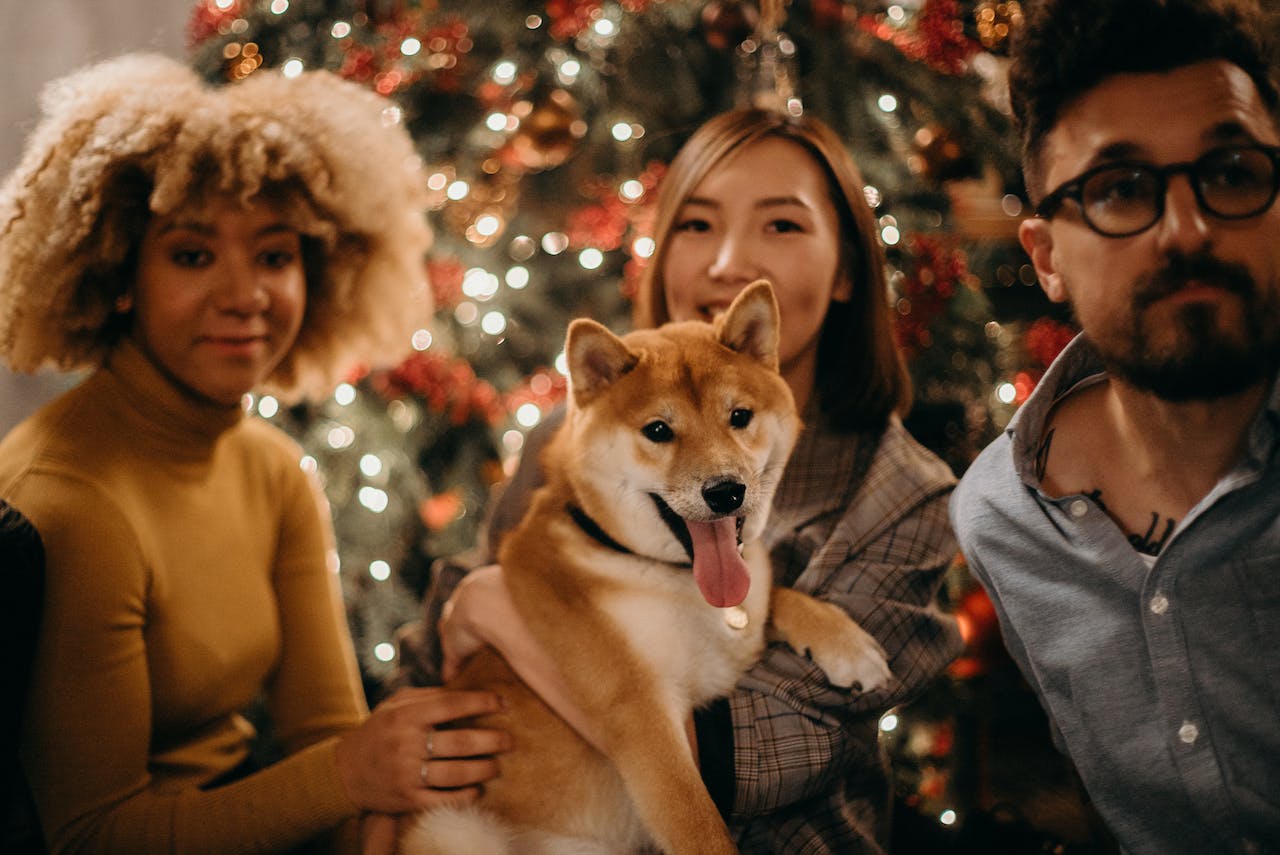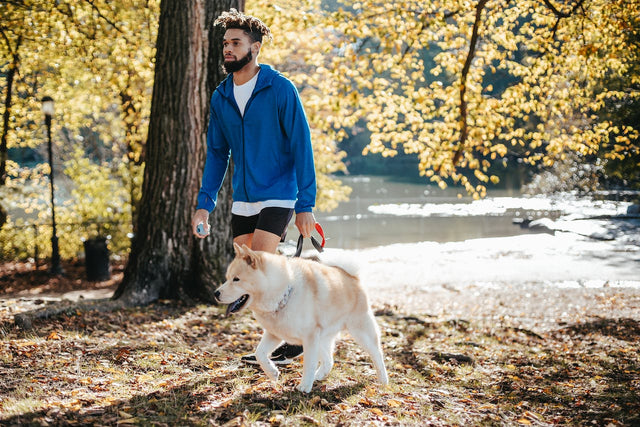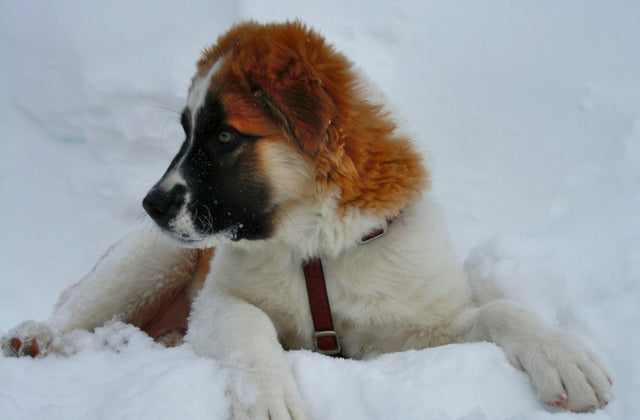As the holiday season approaches and plans for festivity gear up, it's crucial to remind yourself how to ensure pet safety for the holidays. Your home may be teeming with danger spots that you haven't even considered: cheeky holiday plants, festive decorations, sumptuous feasts, not to mention visitor fuss, or travel stress. Regardless of the dangers, these suggestions from the Clearly Loved Pets team will help you determine how to keep your pets safe during the holidays so you can enjoy your festivities without stress.
The Importance of Keeping Pets Safe During the Holidays
Although most consider our pets part of the family, many celebrations include holiday dangers for pets. While we recognize chaos and merriment are inherent parts of celebrating, they are also potential stressors affecting our pets differently than us humans.
Changes in routine or environment combined with strange noises and unfamiliar people might lead to anxiety issues in sensitive pets. Furthermore, eager paws riffling through tantalizing treats could settle on foods toxic for dogs or cats.
Assertively carving out happy memories involves proactively safeguarding them from physical harm or emotional discomfort. Through alertness and awareness about what holiday dangers for pets lurk around the corner, we can embrace festivities without compromising on our dear pets' health and welfare.
Toxic Holiday Plants to Avoid
As a passionate pet owner, I understand fully that the holiday season brings its bounty of joy and cheer, but let's not forget the hidden holiday dangers for pets, especially those presented by certain plants. More specifically, toxic holiday plants could significantly threaten your beloved furry friends.
Poinsettias
Poinsettias are an all-time favorite around Christmas due to their festive red and green foliage. However, poinsettias are known to be mildly poisonous if digested by dogs or cats. Your pet might experience nausea or vomiting from the sap in this plant species' leaves and stems.
Research has indicated that a playful nibble won't likely seriously harm your pet [1]. Poinsettia ingestion can cause some discomfort for your furry companion it will rarely lead to serious complications. However, it’s worth erring caution and including poinsettias on your list of holiday safety tips to secure your house for your pets. If you place poinsettias in your home, monitor these radiant beauties at home, keep them out of reach, or consider opting for artificial options instead.
Holly
Holly’s shiny leaves and bright berries may look beautiful hung on doorways or used as dinner table centerpieces. However, they can hold grave consequences if fiddled with by curious pets.
Even though holly is less toxic than many other seasonal plants, it still incurs adverse effects when ingested because it contains potentially harmful substances such as saponins and methylxanthines. Therefore, if you plan to spend the holidays with pets, you must avoid using holly in too many decorations.
If you keep holly out and about, ensure your pet’s safety by knowing the signs that your pet has nibbled on some: drooling profusely, loss of appetite, diarrhea, or vomiting.
Mistletoe
Mistletoe can become a perilous adversary to your pet. Some variations contain toxins that may cause severe intestinal upset, sudden drop in blood pressure, breathing problems, and even hallucinations. If a lot has been eaten, seizures or even death may follow.
If you celebrate holidays with pets around, always hang your mistletoe high up where pets cannot reach them. If your four-legged friend might have gotten into contact, don't hesitate to seek immediate medical assistance.
Holiday Decorations and Their Hazards
When we think about holiday dangers for pets, many of us forget about holiday decorations. However, those aesthetically pleasing twinkling lights interwoven in fresh green garlands and sparkling baubles dangling from frosted Christmas trees don’t fall on the holiday pet safety tips list. In fact, many pets are unaware that ingesting holiday decorations can seriously impact their health.
Common decorations that can make holidays with pets unsafe include:
- Christmas Trees: Pets, especially cats, have an innate curiosity for climbing on branches which potentially could make the tree topple over, leading to injuries.
- Ornaments: Shattered glass ornaments can cause cuts or even intestinal blockages if ingested by your pet.
- Tinsel & Ribbons: As captivating as tinsel appears swinging from a branch, that precisely is what lures pets, inducing choking hazards and digestive tract damage.
- Candles: Left unattended candles have a risk of burns upon contact and hold potential fire danger if knocked off.
- Electric Lights: Chewing on electric cords poses risks like mouth burns and pet electrification.
How do you ensure pet safety for the holidays? Simple measures can go a long way in providing safe surroundings without curbing festive aesthetics.
Consider using unbreakable ornaments and keep them higher up on the tree where reach is difficult. Shield wires wherever possible and extinguish any open flames before leaving the room. Lastly, supervise your pets in highly decorated spaces or confine decorations to areas less accessed by your pets.
Remember, balance is key here. While exuding holiday spirits, let's also prioritize pet safety during these festive times. The harmony of celebration and caution will ensure a joyful and safe holiday season for all, including our furry companions.
Safe Handling of Festive Foods
Holidays are often celebrated with an abundance of rich and delicious foods. However, while these culinary delights may tantalize your taste buds, they may not suit your furry companions. Identifying the types of holiday foods that can risk your pet's health is critical.
What Holiday Foods Are Harmful to Pets?
Several traditional holiday foods can be toxic or even fatal to pets if ingested. Take note of the following:
- Chocolate: Despite being a favorite treat for humans, chocolate contains theobromine, which is lethal to pets—particularly dogs.
- Grapes and Raisins: Found in Christmas puddings and mince pies, eating these fruits may cause kidney failure in certain pets like dogs.
- Onions and Garlic: These common ingredients in stuffing and gravies are part of the Allium family, which can damage red blood cells in cats and dogs.
- Alcohol: Even small quantities can lead to serious health problems like heart arrhythmia, seizures, tremors, or respiratory failure.
By keeping these harmful foods away from you pet’s reach during festive times, this will contribute towards effective ways to keep your pets safe during the holidays.
How to Keep Food Out of Reach
While acknowledging what nutrients are dangerous for our treasured pets is important, arranging your home so that hazardous food items remain inaccessible is equally valuable.
- High Shelving: Elevating potential hazards on high shelves keeps them beyond their line-of-sight or jumping ability.
- Covered Garbage Bins: Ensure any discarded food goes into Pet-Proof bins with secure lids.
- Supervise Meal Times: Never leave food unattended at their level when celebrating around feasting tables.
- Snack Safely: Limit snack time to areas where it becomes difficult for curious paws to reach crumbs or portions dropped by mistake.
By stripping away the temptation, you safeguard your pet, and the last thing any of us want during this joyous time is our pets falling ill. After all, we want them to enjoy the festivities too! Not only does tidiness benefit their safety, but it also reinforces desired behavioral traits. Using these tips as a guide will certainly contribute towards keeping your pets safe during holiday celebrations.
Dealing With Holiday Stress in Pets
The holiday season brings a flurry of activity that can be stressful for pets. From finding different ways to keep your pets safe during the holidays to dealing with changes in routine and new sounds and smells, everything can heighten their anxiety. Being able to identify these signs of stress is critical for pet owners.
Identifying Signs of Stress or Anxiety in Pets During the Busy Holiday Season
Like humans, pets also experience stress and anxiety, which may escalate during the festive period. Remember, each animal exhibits stress differently; therefore, understanding your pet's regular demeanor goes a long way in detecting any change.
Signs of Anxiety or Stress in Pets
Key indicators include decreased appetite, increased isolation, restlessness, excessive grooming, or irritability. Increased toileting accidents indoors despite being house-trained might indicate stress as well.
Strategies for Reducing Stress
Reducing your pet's level of anxiety involves both preventive measures and suitable interventions when required:
- Stick to daily feeding times, walks, or playtime as much as possible.
- If you have guests or loud noises from fireworks, ensure a quiet room where your pet can retreat.
- Use calming aids such as pheromone plugins/sprays, or consider professional veterinary help.
Remember, consistency is crucial here; irregular attempts won't bear fruit.
Introducing New People To Pets
Holidays often bring unfamiliar faces into our homes, which could be overwhelming for pets accustomed to family members around them all year round.
To ensure smooth interactions, instruct guests about accepted behavior towards your pet i.e., not playing rough or feeding them scraps from the table, which can upset their stomachs later.
Traveling Tips Or Leaving Pets At Home
If you're considering traveling:
- Ensure your pet is comfortable with prolonged car trips by first taking them on short drives.
- Check the pet policy of any hotels or friends' homes you plan to visit.
If you decide to leave your pets at home:
- Find a pet sitter who can maintain their routine in familiar surroundings.
- Leave detailed instructions for their feeding, medications, and emergency contact numbers.
Above all, holidays should be fun for every family member, including our furry companions. Employ these strategies to keep your pets safe during the holidays and help them enjoy this festive season alongside us.
Clearly Loved Pet Pens: The Perfect Safety Solution for the Holidays
As you can see, there are many holiday dangers for pets. Regardless of how well behaved your dog or other pet is, certain situations can pose threats. Therefore, one of the best ways to keep your pets safe during the holidays is by investing in a sanctuary for your pet where they can be a part of the celebrations without putting themselves in harm’s way.
Our lucidium pet pens protect your furry friends without making them feel excluded from your holiday plans. These clear pet enclosures allow your pet to see you at all times and keep them safe and away from possible hazards.
When it comes to Christmas and safety for your pets, there truly are no better options. And, since our pet pens come in a variety of sizes and can be configured to fit the space inside your home. Whether it’s Christmas or Easter, Clearly Loved Pets is here to help make it easier to celebrate holidays with pets.
Resources
[1] https://www.ncbi.nlm.nih.gov/pmc/articles/PMC10220692/



